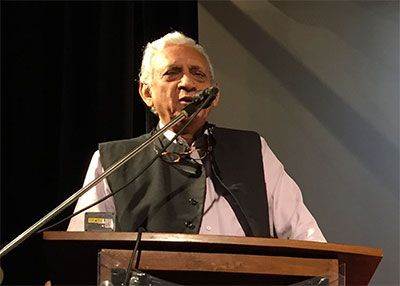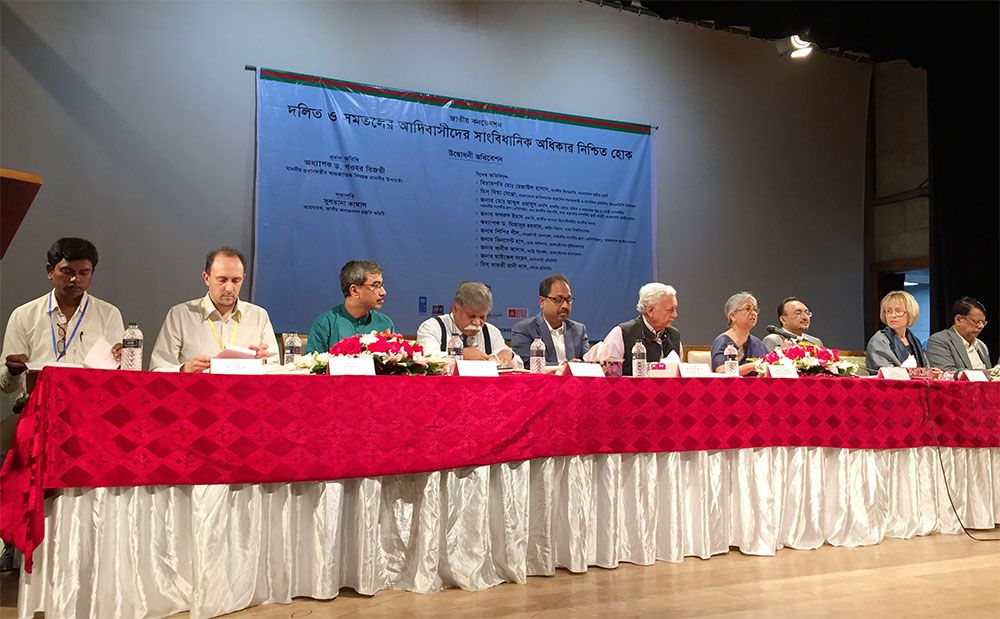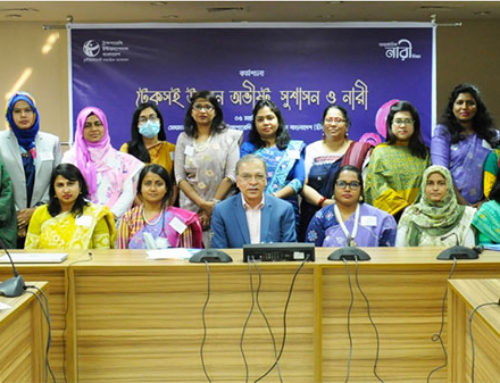Ensuring the rights of Dalits and Plain land Adibashis in line with the Constitution
 In a statement Dr Gowher Rizvi, International Affairs Advisor to the Hon’ble Prime Minister of Bangladesh, said, “To achieve Sustainable Development Goals-SDGs by 2030, we all have to move forward together. And for this reason, we will have to acknowledge Dalits and indigenous people.” He also said that Bangladesh has made many improvements in many sectors but discriminations still prevail. The Government is determined to curb the discriminations and for this, the Government and Non-government organizations must work together.
In a statement Dr Gowher Rizvi, International Affairs Advisor to the Hon’ble Prime Minister of Bangladesh, said, “To achieve Sustainable Development Goals-SDGs by 2030, we all have to move forward together. And for this reason, we will have to acknowledge Dalits and indigenous people.” He also said that Bangladesh has made many improvements in many sectors but discriminations still prevail. The Government is determined to curb the discriminations and for this, the Government and Non-government organizations must work together.
Dr Rizvi made these remarks as the Chief Guest of a day-long National Convention held in Dhaka on 1 November 2018 at Liberation War Museum. The National Convention was jointly organized by HEKS/EPER, People’s Empowerment Trust (PET), Center for Social Activism (CSA), Creative Media Limited (CML) and UNDP to ensure the rights of Dalits and Plain land Adibashis in line with the Constitution.
Eminent human rights activist Advocate Sultana Kamal was the Convener of this National Convention. In her speech she said that, there is a confusion in the updated information of the survey by the Government on the numbers of the indigenous people who are living in the Chattogram Hill-tracts and Dalits and indigenous people who are living in the plain-land of Bangladesh. This confusion is keeping them disadvantaged in every aspect from getting basic rights and other special facilities allocated by the State, like remaining abandoned from availing the land rights and the Constitutional rights. In her closing remarks, she said that, this is the first time it has been possible to bring the policy makers, other stakeholders, Dalit and Plain land Adibashis in a single platform. So, she urged that this must be continued.
In the panel of Special Guests of the opening ceremony Honourable Justice Rezaul Hasan, Bangladesh Supreme Court; Ms Mia Seppo, UN Resident Coordinator and UNDP Country Representative for Bangladesh; Mr Abdul Wadud, MP; Chair, APPG on Dalit and Plain land Ethnic Minorities; Professor Dr Mizanur Rahman, the former Chairman of Human Rights Commission; Mr Shishir Shil, Secretary General, APPGs, Bangladesh National Parliament; Mr Vincent Hug, Desk Officer, HEKS/EPER Switzerland, Mr Anik Asad, Country Director, HEKS/EPER Bangladesh; and Ms Bharati Rani Das, a representative from Dalit community and Mr Michael Soren, a representative from Indigenous community were present.
A November Dhaka Declaration has been adopted from the resolution of opening and closing sessions, six distinct papers of three parallel sessions, findings from the grassroots level, opinion and suggestion from marginalized groups and working experience from the activists and experts. In the declaration, emphasis was given on climate adaptive livelihoods and climate finance for sustainable development. This will help in achieving the SDG 13 (Climate Action) which is also a national agenda for Bangladesh.
Professor Dr Mizanur Rahman emphasized that the Anti-discrimination Law should be enacted by the Government of Bangladesh without any delay.
In her speech, Ms Mia Seppo focused on understanding of attitudes and lifestyles of the Adibashis. She mentioned that the Government must take into considerations the recommendations of UPR and other international Human Rights reports including Universal Declaration on rights of the Indigenous people.
Md. Mozahidul Islam, Program Coordinator, HEKS/EPER Bangladesh was the Moderator of the opening session.
There were six papers were presented in three parallel sessions on: Constitutional Rights of Plain land Adibashis and Dalits: The discrimination and violation of Human Rights. Advocate Sara Hossen, Honorary Executive Director, BLAST was the Chief Guest and Professor Mezbah Kamal, Department of History, University of Dhaka was the Chair of this session. Philip Gain, Director, Society for Environment and Human Development (SEHD) and Sanjeeb Drong, Secretary General, Bangladesh Indigenous Peoples’ Forum presented two papers on the issue.
The second parallel session on: Rights of Plain land Adibashis and Dalits: on land, Dr Shamsul Alam, Member, Member (Sr. Secretary), General Economic Division, Ministry of Planning was the Chief Guest and Meghna Guhathakurta, Executive Director, Research Initiatives, Bangladesh (RIB) was the Chair of this session. Shamsul Huda, Executive Director, Association for Land Reform and Development (ALRD) and Professor Ainoon Naher, Department of Anthropology, Jahangirnagar University presented two papers on the issue.
The third parallel session on: Constitutional Rights of Plain land Adibashis and Dalits: Climate Change, Sustainable Adaptation and Access to Finance: where Asaduzzaman, Former Research Director, Bangladesh Institute of Development Studies (BIDS) was the Chief Guest and Khushi Kabir, Coordinator, Nijera Kori was the Chair of this session. Khurshid Alam, Assistant Country Director, UNDP Bangladesh and Dr Ahsan Uddin, Member, Independent Adviser Panel, Green Climate Fund presented two papers on the issue.
In the panel of Special Guests of the closing ceremony Mr Fazle Hossen Badshah, Chair, Parliamentary Caucus on Ethnic Minority; Mr Ujjal Bikash Dutta, Member, Bangladesh Public Service Commission; Sanjida Khanam MP, Co-Chair, All-Party Parliamentary Groups (APPGs); Mr Sudipto Mukherjee, Country Director, UNDP Bangladesh; Mr AKM Abdus Salam, Director General, NGO Affairs Bureau, Prime Minister Office; Mr Vincent Hug, Desk Officer, HEKS/EPER Switzerland; and Ms Dinomoni Tigga being a representative from Indigenous community and Mr Raju Bashfor, being a representative from Dalit community were presented.
In the closing session, Mr Asaduzzaman Noor, MP, Hon’ble Minister, Ministry of Cultural Affairs, People’s Republic of Bangladesh was present as the Chief Guest. He expressed solidarity with the convention and remarked that he would make sure that the voice of the Plain land Adibashis and Dalits reach the Government. He also urged that the development partners and Government should work in harmony to make a holistic change in the quality of living for them.
Sultana Kamal, Chair for the convention, said, and she expressed her expectation that the Government will be with these marginalized communities. She also urged on enactment of the anti-discrimination law as soon as possible. At the end, she thanked everybody for coming and supporting for successful completion of this great event.
Professor Robaet Ferdows, Associate Professor, Department of Journalism and Mass Communication was the Moderator of the closing session.
It was a nationally united call where more than four hundred participants took part from- Dalits and Plain land Adibashi communities, development organisations who are working on the right protection issues of marginalized communities, civil society organisations, international development organisations, respective Government officials, political leaders and youth groups from all over the country.




